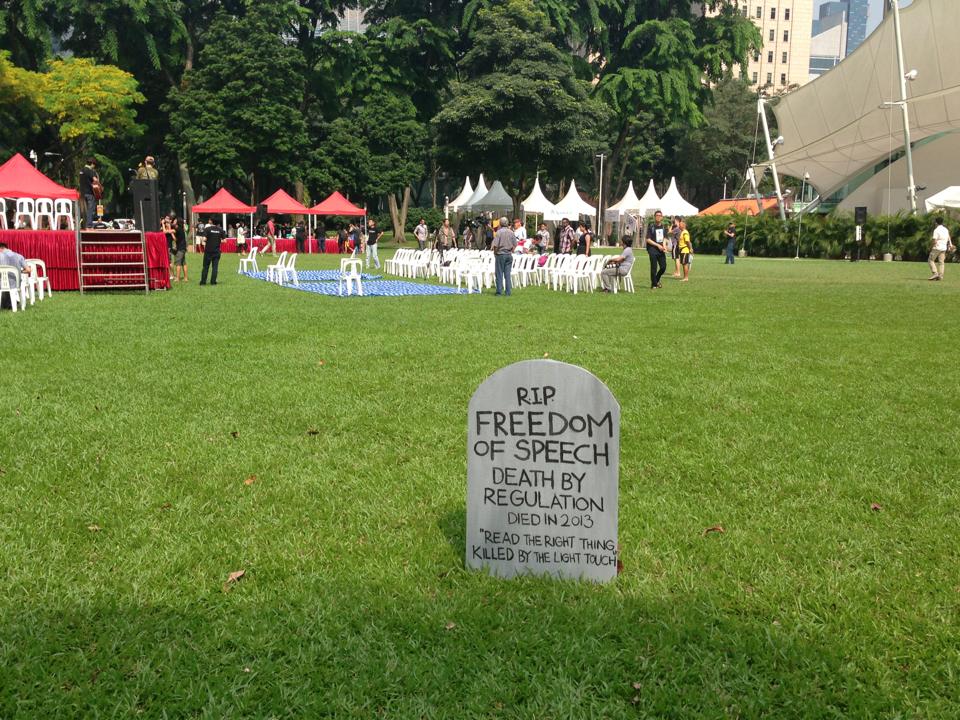By Calvin Cheng
In the wake of the shutdown of the Breakfast Network, the Free My Internet movement issued a statement questioning the Media Development Authority’s ability to act as a Media Authority.
This is not only an overreaction, it was a statement based on several logical fallacies.
To begin with, the shutdown of the Breakfast Network has been held up as an example of how the MDA’s regulations have caused the demise of alternative media, and the first new media martyred by actions of the MDA.
Although it is true that the Breakfast Network had to shut-down because it did not register, it is a leap of logical reasoning to say that it was because the registration was too onerous that it did so. This is especially when its rival, The Independent, not only chose to register, but did so without raising a hue and cry in cyberspace.
It is curious why the Breakfast Network could not follow in the footsteps of The Independent when both are helmed by print media veterans, Bertha Henson and PN Balji respectively. Both individuals, as respected journalists with years of experience, would also have intimate knowledge of the Government’s longstanding objections to foreigners, through funding or otherwise, interfering in Singapore politics. It is even more perplexing why The Breakfast Network would find the legal commitments too onerous, when The Independent, whose co-founder is a senior lawyer, was able to navigate the same regulations.
There would be a stronger case for the Breakfast Network if both it and The Independent, had both been unable to register, especially since arguably, The Independent has the stronger team with years of entrepreneurial, legal and journalistic experience in its founding team. If it also foundered at the regulatory stage, then the Breakfast Network, arguably a one-woman company, could argue that it was the regulatory hurdles that killed it, rather than a lack of managerial expertise and depth.
But this is not the case. Instead, The Independent has, by being able to deftly manoeuvre through the regulatory space, put itself in the position of being the only overtly commercial alternative media covering politics in Singapore, which stands it in good stead of becoming Singapore’s Huffington Post.
The basis of the Free My Internet Statement – the Breakfast Network’s demise – is thus a weak example to base their criticism of the MDA upon.
There were also other egregious examples of a failure to understand the current regulatory framework.
Firstly, print and broadcast media has always been subjected to rules discouraging the interference of foreigners, including funding, in local politics. Yahoo, brought up as an example of inconsistency by the FMI movement, is already covered by the Broadcast Act. There are no double-standards.
Secondly, Facebook and Twitter feeds owned by individuals that cover political content, which are prima facie not commercial or commercialised, cannot reasonably be asked to commit not to take foreign funding. Being non-commercial, many run as a hobby, they do not need any funding in the first place. It makes no sense for any regulator to ask an individual hobbyist to register a company so that they can regulate him. That is just twisted logic.
Overall, a lot of the misunderstanding about and distrust over MDA’s regulations, and the apprehension regarding the impending updating of the Broadcast Act, can be dispelled if one fundamental principle can be understood: that Cyberspace is not a separate world, but part of our real world. The Internet is just another media, and should be subject to the same laws that cover all media, be it print or broadcast. It is not special.
Most of all, the emergence of a new technology is insufficient reason to re-evaluate fundamental principles a society has been based on successfully for years. The Internet is no different.
Mr Calvin Cheng is a former nominated member of parliament.

